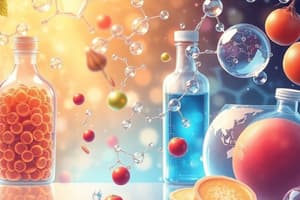Podcast
Questions and Answers
What are carbohydrates?
What are carbohydrates?
Any of a large group of organic compounds occurring in foods and living tissues, including sugars, starch, and cellulose. They can be broken down to release energy in the human body.
What foods are carbohydrates made out of?
What foods are carbohydrates made out of?
Fruits, vegetables, and breads.
What are carbohydrates made from?
What are carbohydrates made from?
Carbohydrates are molecules made from carbon, hydrogen, and oxygen.
Why do living things need carbohydrates?
Why do living things need carbohydrates?
What are monosaccharides?
What are monosaccharides?
What are disaccharides?
What are disaccharides?
What can carbohydrates do for plants?
What can carbohydrates do for plants?
What does glycogen do?
What does glycogen do?
Flashcards are hidden until you start studying
Study Notes
Definition of Carbohydrates
- Organic compounds found in foods and living tissues, including sugars, starch, and cellulose.
- Composed of carbon, hydrogen, and oxygen in a 2:1 ratio, similar to water.
- Play a vital role in energy release within the human body.
Sources of Carbohydrates
- Common foods rich in carbohydrates include fruits, vegetables, and breads.
Composition of Carbohydrates
- Formed from three elements: carbon, hydrogen, and oxygen.
- Monosaccharides (single sugars) and disaccharides (two chemically linked sugars) are the basic structures, often referred to as sugars.
Importance of Carbohydrates for Living Things
- Serve as the primary energy source for living organisms.
- Provide structural functions in plants and some animals.
Monosaccharides
- Single sugar units, the simplest form of carbohydrates.
- Examples include glucose, galactose (found in milk), and fructose (found in many fruits).
Disaccharides
- Composed of two monosaccharides linked together.
- Common types include lactose (found in milk), maltose (found in malted foods), and sucrose (table sugar).
Structural Role in Plants
- Carbohydrates contribute to structural integrity and functions in plants and some animals.
Glycogen
- A polysaccharide stored in muscles that serves as an energy reserve for muscle contraction and movement.
Studying That Suits You
Use AI to generate personalized quizzes and flashcards to suit your learning preferences.




